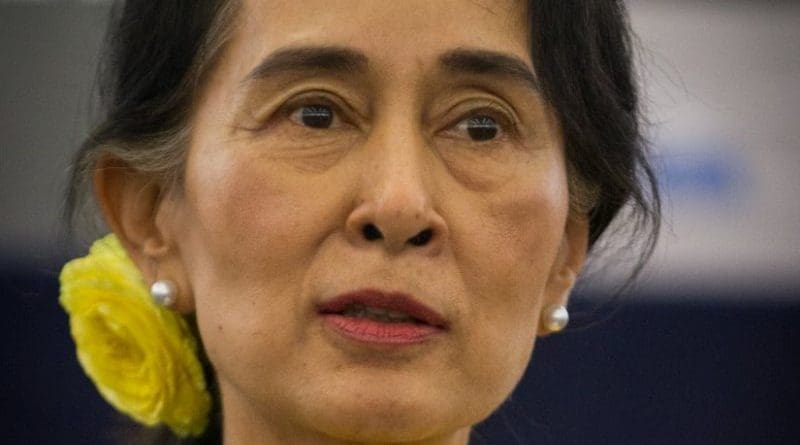Myanmar’s Transition To Civilian Rule: A Path Full Of Hurdles – Analysis
By Obja Borah Hazarika*
The election of U Htin Kyaw as President is a watershed moment in Myanmar’s history. Htin Kyaw’s government would be Myanmar’s first democratic administration since 1962 when the military seized power. Htin Kyaw’s secured 360 votes from among 652 ballots cast. Myint Swe, who was the military nominee, won 213 votes, and will become the first vice president. Henry Van Tio, Htin Kyaw’s NLD running mate, won 79 votes and will become the second vice president.
During 1962-2010, the military junta ruled the country with an iron fist which drew sanctions from the international community. Although the 2015 elections were free and fair, Aung Sang Suu Kyi continued to be barred from becoming President due to constitutional clauses which state that citizens with foreign spouses and children could not become president. Suu Kyi’s National League for Democracy (NLD) lacked the parliamentary power to amend the constitution even after winning an overwhelming majority of seats in the latest elections.
Being unable to override the above-mentioned constitutional clause despite several attempts to coax the military to relax these provisions, Suu Kyi nominated Mr. Htin Kyaw, an economist and writer, as the party’s presidential candidate, who subsequently was elected as President. Suu Kyi had been clear that despite not being President she would run the government.
Immediately after the results, some action has already been taken by Hyin Kyaw with regard to administration and governance of the country. First, even before assuming power, U Htin Kyaw proposed that the number of ministries would be slashed mainly in order to cut costs. Under the plan to streamline the government, 21 ministries will take the place of the current 36. The reshuffle, however, would not impact the ministers for home affairs, defence and border affairs which remain under military control.
Under the new plan, planning and finance are to be merged into one ministry, while a ministry of transportation and communication would be created which would merge three previous ministries. Culture and religious affairs, agriculture, livestock and irrigation, electric power and energy, labor, immigration and population would be merged. Ministries including cooperatives, rail transportation, science and technology and sports have been subsumed into others. The Ministry of Information, which was integral to the erstwhile military junta, was not impacted by the reshuffle. In an effort to ensure national reconciliation among the restive ethnic groups, the NLD government also announced the creation of an ethnic affairs ministry.
In another move, Aung San Suu Kyi was named chair of a parliamentary team, which gave rise to speculation that she would not assume a formal position in the new government. It was suggested that she may assume the position of foreign minister which would allow her access to the National Defence and Security Council, wherein the military holds a majority of the 11 seats and which continues to be a powerful body in terms of the politics of the country.
In yet another step, it was also recently announced by the NLD that as it had an overwhelming majority in the government, it would choose the chief ministers in all `14 states and regions as was the rule under the 2008 constitution, wherein it was stated that the chief ministers are chosen by the president from among elected or appointed MPs, regardless of which party holds a majority in the state. The military and the ethnic minority parties of Rakhine, Shan and Kachin, had in vain opposed this decision by the NLD. The NLD did not win a majority in Shan and Rakhine states but would be appointing the Chief Ministers in these regions nonetheless. In Rakhine, the Arakan National Party, insisted that it should have the right to form the state government, and appoint the chief minister. The Arakan National Party even stated that in case it was not given the chief minister’s position it would act as an opposition party. In fact in July 2015, the military vetoed a change which the NLD wanted with regard to the constitution so that the chief ministers would be selected directly by the states and regions. The volte-face by the NLD with its recent announcement of appointing the Chief Ministers itself with no regard to the party in power in the states and regions has been largely viewed as going against the spirit of national reconciliation.
Thus, the new government and the president elect as well as Suu Kyi seem to have implemented several changes in the administration. However, monumental challenges in the form of ethnic and communal strife as well as economic difficulties stare the new government in the face. Curtailing the presence of the military which continues to hold tremendous power in the parliament in Myanmar remains yet another hurdle in the path of the NLD-led government. One-quarter of seats in both Houses of Parliament are reserved for the military which implies that their approval is essential for any constitutional amendment. The military’s refusal to let Ms. Suu Kyi become the President and successfully getting Myint Swe, a retired general who served the previous junta and continues to be blacklisted by the US, elected as the first vice-president, underscored the intent of the military to continue to play a leading role in managing the affairs of Myanmar despite the overwhelming mandate won by the NLD. Thus, the NLD led by Htin Kyaw and Suu Kyi have an uphill task in front of them which they need to tackle in order to expedite the democratic transition of the country.
*Obja Borah Hazarika is an Assistant Professor of Political Science at the Dibrugarh University, Assam. She can be reached at: [email protected]

